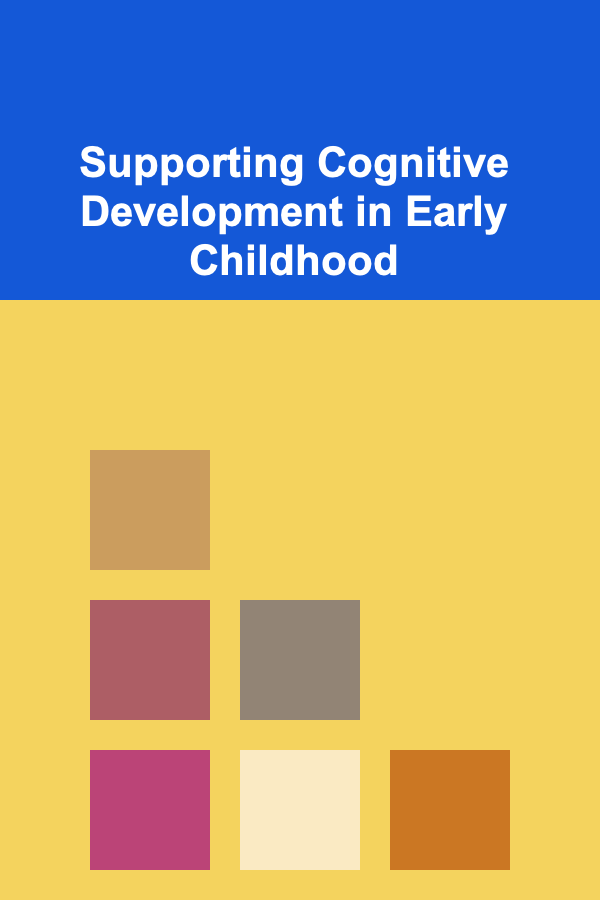
Supporting Cognitive Development in Early Childhood
ebook include PDF & Audio bundle (Micro Guide)
$12.99$11.99
Limited Time Offer! Order within the next:

Early childhood, spanning from birth to approximately eight years old, is a period of remarkable cognitive growth and development. During these formative years, children acquire foundational skills that shape their future learning, problem-solving abilities, and overall intellectual capacity. Cognitive development encompasses various processes, including perception, attention, memory, language, reasoning, and problem-solving. Providing a stimulating and nurturing environment is crucial for fostering optimal cognitive development in young children. This article delves into various strategies and practices that parents, educators, and caregivers can employ to effectively support this critical aspect of a child's growth.
Understanding Cognitive Development: A Foundation
Before exploring practical strategies, it's essential to understand the theoretical underpinnings of cognitive development. Jean Piaget's theory of cognitive development, a cornerstone in the field, posits that children progress through distinct stages of cognitive growth. These stages are characterized by specific cognitive abilities and limitations. While Piaget's theory has been influential, it's important to note that modern research suggests that cognitive development is more continuous and less stage-like than initially proposed. Other influential theories, such as Vygotsky's sociocultural theory, emphasize the role of social interaction and cultural context in shaping cognitive development.
Key aspects of cognitive development in early childhood include:
- Sensory-Motor Stage (Birth to 2 years): Characterized by learning through senses and motor actions. Infants develop object permanence -- the understanding that objects continue to exist even when out of sight.
- Preoperational Stage (2 to 7 years): Marked by the development of symbolic thinking, language, and imagination. Children in this stage often exhibit egocentrism (difficulty seeing things from another's perspective) and struggle with conservation (understanding that the quantity of something remains the same despite changes in its appearance).
- Concrete Operational Stage (7 to 11 years): Characterized by the ability to think logically about concrete events and objects. Children in this stage develop conservation skills and can perform mental operations. While this stage falls partially outside the 'early childhood' definition used here, understanding it provides context.
Furthermore, the development of executive functions, a set of cognitive skills that control and regulate thoughts and actions, is particularly crucial during early childhood. These functions include:
- Working Memory: The ability to hold and manipulate information in mind.
- Inhibitory Control: The ability to resist impulses and distractions.
- Cognitive Flexibility: The ability to switch between tasks or perspectives.
These executive functions are essential for learning, problem-solving, and social interaction. They are like the "air traffic control" of the brain, allowing children to focus, plan, and manage their behavior effectively. Weaknesses in these areas can lead to difficulties in school and other areas of life.
Creating a Stimulating and Supportive Environment
The environment plays a crucial role in shaping a child's cognitive development. A stimulating and supportive environment provides opportunities for exploration, experimentation, and learning.
1. Provide a Rich and Varied Sensory Experience
Sensory experiences are the foundation of learning in early childhood. Engaging children in activities that stimulate their senses -- sight, sound, touch, taste, and smell -- can enhance their cognitive development.
- Visual Stimulation: Provide colorful toys, books, and artwork. Expose children to different environments and visual patterns. Engage them in activities like drawing, painting, and building with blocks.
- Auditory Stimulation: Read aloud to children, play music, and encourage them to sing and dance. Expose them to different sounds, such as nature sounds or musical instruments.
- Tactile Stimulation: Provide opportunities for children to explore different textures, such as sand, water, playdough, and fabrics. Engage them in activities like building with blocks, playing with toys, and exploring nature.
- Taste and Smell Stimulation: Introduce children to a variety of healthy foods with different tastes and smells. Engage them in activities like cooking or gardening. (Be mindful of allergies and introduce new foods carefully.)
Sensory play isn't just about fun; it helps children develop their understanding of the world around them, build neural connections in the brain, and enhance their problem-solving skills.
2. Encourage Exploration and Play
Play is essential for cognitive development. It allows children to explore their environment, experiment with new ideas, and develop their problem-solving skills. Provide children with ample opportunities for both structured and unstructured play.
- Unstructured Play: This type of play is child-led and allows children to use their imagination and creativity. Provide children with a variety of open-ended materials, such as blocks, art supplies, and dress-up clothes.
- Structured Play: This type of play is guided by an adult and involves specific rules or goals. Examples include board games, puzzles, and organized sports.
Both types of play are important for cognitive development. Unstructured play fosters creativity and problem-solving, while structured play helps children develop social skills and learn to follow rules. Resist the urge to over-schedule children's time with structured activities. They need time to explore and play freely.
3. Promote Language Development
Language is a fundamental tool for cognitive development. It allows children to communicate their thoughts and ideas, learn new information, and develop their reasoning skills. Engage children in conversations, read aloud to them, and encourage them to tell stories.
- Talk to children frequently: Even before they can speak, babies benefit from hearing language. Narrate your actions, describe objects, and ask questions.
- Read aloud regularly: Reading aloud exposes children to new vocabulary, sentence structures, and ideas. Choose books that are age-appropriate and engaging.
- Encourage storytelling: Ask children to tell stories about their experiences or make up their own stories. This helps them develop their imagination, language skills, and narrative skills.
- Use rich vocabulary: Don't be afraid to use sophisticated words. Children learn new words by hearing them in context.
- Ask open-ended questions: Instead of asking questions with simple yes or no answers, ask questions that encourage children to think and elaborate. For example, instead of asking "Did you like the story?", ask "What was your favorite part of the story and why?"
Language development is not just about vocabulary. It's also about developing the ability to understand and use language to communicate effectively. Active listening is key. Pay attention to what children are saying and respond thoughtfully.
4. Foster Problem-Solving Skills
Problem-solving is a crucial cognitive skill that allows children to overcome challenges and achieve their goals. Provide children with opportunities to solve problems in a safe and supportive environment.
- Present age-appropriate challenges: Give children tasks that are slightly challenging but within their capabilities. This encourages them to think critically and develop problem-solving strategies.
- Encourage experimentation: Allow children to try different approaches to solving problems. Don't be afraid to let them make mistakes. Mistakes are learning opportunities.
- Ask guiding questions: Instead of giving children the answers, ask questions that help them think through the problem. For example, "What have you tried so far?", "What could you try next?", "Why do you think that didn't work?"
- Provide support and encouragement: Let children know that you believe in their ability to solve the problem. Offer encouragement and support, but avoid doing the problem for them.
Problem-solving can involve anything from figuring out how to build a tower with blocks to resolving a conflict with a sibling. The key is to provide children with opportunities to practice their problem-solving skills in a variety of contexts.
5. Promote Social and Emotional Development
Cognitive development is intertwined with social and emotional development. Children who are emotionally secure and have strong social skills are better able to learn and thrive. Create a nurturing and supportive environment where children feel safe to express their emotions and interact with others.
- Teach children about emotions: Help children identify and label their emotions. Talk about different emotions and how they make you feel.
- Model healthy emotional expression: Show children how to express your own emotions in a healthy way.
- Encourage empathy: Help children understand and share the feelings of others.
- Promote positive social interactions: Create opportunities for children to interact with their peers in a positive way. Teach them how to share, cooperate, and resolve conflicts peacefully.
Emotional intelligence is just as important as intellectual intelligence. Children who are emotionally intelligent are better able to manage their emotions, build relationships, and succeed in school and life.
6. Nurture Creativity and Imagination
Creativity and imagination are essential for cognitive development. They allow children to think outside the box, generate new ideas, and solve problems in innovative ways. Provide children with opportunities to express their creativity and imagination.
- Provide art supplies: Give children access to a variety of art supplies, such as crayons, markers, paint, paper, and clay.
- Encourage dramatic play: Provide children with dress-up clothes, props, and other materials that they can use to create imaginary scenarios.
- Read imaginative stories: Choose books that spark children's imagination and transport them to different worlds.
- Ask open-ended questions: Ask questions that encourage children to think creatively and come up with new ideas. For example, "What would happen if...?", "How could we make this even better?", "What other possibilities are there?"
Don't be afraid to let children get messy and make mistakes. The process of creating is more important than the final product. Focus on encouraging their exploration and experimentation.
7. The Importance of Nutrition and Sleep
Adequate nutrition and sleep are fundamental prerequisites for optimal cognitive development. A well-nourished brain functions more efficiently, supporting learning and memory consolidation. Similarly, sufficient sleep allows the brain to process information and consolidate memories acquired during the day.
- Provide a balanced diet: Ensure that children consume a diet rich in fruits, vegetables, whole grains, and lean protein. Limit processed foods, sugary drinks, and unhealthy fats.
- Ensure adequate sleep: Establish a consistent sleep schedule and create a relaxing bedtime routine. The amount of sleep children need varies by age, but generally, preschoolers need 10-13 hours of sleep per night.
- Limit screen time: Excessive screen time can interfere with sleep and cognitive development. Limit screen time to age-appropriate levels and avoid screen time before bed.
Nutritional deficiencies and sleep deprivation can impair cognitive function, leading to difficulties with attention, memory, and learning. Prioritizing nutrition and sleep is a critical investment in a child's cognitive development.
8. Cultivate a Growth Mindset
A growth mindset, the belief that abilities and intelligence can be developed through dedication and hard work, is crucial for fostering cognitive development. Children with a growth mindset are more likely to embrace challenges, persist in the face of setbacks, and view effort as a path to mastery.
- Praise effort and progress, not just outcomes: Focus on praising children's effort, strategies, and persistence, rather than simply praising their intelligence or talent. For example, instead of saying "You're so smart!", say "You worked really hard on that problem and you figured it out!"
- Encourage children to embrace challenges: Frame challenges as opportunities for growth and learning. Help children see that mistakes are a normal part of the learning process.
- Teach children about the brain: Explain to children how the brain grows and changes when they learn new things. This can help them understand that their intelligence is not fixed.
- Model a growth mindset yourself: Show children that you are also willing to learn and grow. Talk about your own challenges and how you are working to overcome them.
A growth mindset empowers children to take ownership of their learning and believe in their potential to succeed. This is a powerful tool for fostering lifelong learning and cognitive development.
Addressing Potential Challenges
While many children develop cognitively at a typical pace, some may experience challenges that require additional support. It's important to be aware of potential developmental delays and seek professional help when necessary.
1. Recognizing Developmental Delays
Developmental delays can manifest in various ways, including:
- Language delays: Difficulty understanding or using language.
- Motor delays: Difficulty with gross or fine motor skills.
- Social-emotional delays: Difficulty interacting with others or regulating emotions.
- Cognitive delays: Difficulty with problem-solving, memory, or attention.
If you suspect that a child is experiencing developmental delays, it's crucial to consult with a pediatrician or other qualified healthcare professional for an evaluation. Early intervention is key to maximizing a child's potential.
2. Seeking Professional Help
Depending on the nature and severity of the developmental delay, various professional services may be beneficial, including:
- Speech therapy: To address language delays.
- Occupational therapy: To address fine motor skills and sensory processing issues.
- Physical therapy: To address gross motor skills.
- Early intervention programs: To provide comprehensive support for children with developmental delays.
- Psychological counseling: To address social-emotional challenges.
Remember, seeking professional help is not a sign of weakness. It's a sign of strength and a commitment to supporting a child's optimal development.
Conclusion
Supporting cognitive development in early childhood is a crucial investment in a child's future. By providing a stimulating and supportive environment, promoting language development, fostering problem-solving skills, nurturing creativity and imagination, and addressing potential challenges, parents, educators, and caregivers can help children reach their full cognitive potential. Remember that every child is unique and develops at their own pace. The key is to create an environment that is responsive to their individual needs and interests, providing them with the opportunities and support they need to thrive. By embracing these strategies, we can empower the next generation to become critical thinkers, creative problem-solvers, and lifelong learners. Continual learning and adaptation, staying informed about new research and best practices, are essential to providing the most effective support for cognitive development in early childhood.

How to Prioritize Home Expenses in Your Monthly Budget
Read More
How to Use Lighting to Make Your Home Feel Like a Retreat
Read More
Savvy Fleet Operations: A Comprehensive Guide for Fleet Managers
Read More
How to Understand the Different Types of Blockchains
Read More
Cooking Healthy Meals for Weight Loss: A Comprehensive Guide
Read More
How to Build a Budget-Friendly Home Recording Studio
Read MoreOther Products

How to Prioritize Home Expenses in Your Monthly Budget
Read More
How to Use Lighting to Make Your Home Feel Like a Retreat
Read More
Savvy Fleet Operations: A Comprehensive Guide for Fleet Managers
Read More
How to Understand the Different Types of Blockchains
Read More
Cooking Healthy Meals for Weight Loss: A Comprehensive Guide
Read More